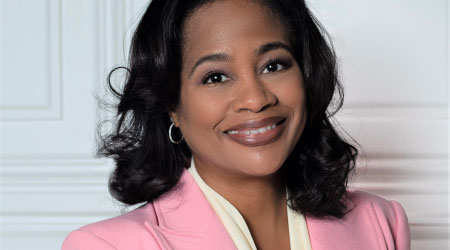From Teaching to Facilities Management: How Machion Jackson Found Her Calling
Detroit schools leader Machion Jackson’s teaching background helped mold her career in facilities.
By Mackenna Moralez, Associate Editor
When Machion Jackson first started teaching high school English, a career in facilities management was the furthest thing from her mind. She had her eyes set on becoming a principal one day, continuing to help mold the minds of students that entered the Detroit Public Schools Community District. It wasn’t until she fulfilled that dream that a role in facilities started to sound appealing.
Soon after becoming a principal, Jackson was afforded the opportunity to work hand-in-hand with construction companies and architects on an old school building that needed to be updated in order to house students. During a year-and-a-half-long renovation, she was on the front lines, making decisions that not only best suited the learning environment, but also the facility department for years to come.
“I was the liaison for that entire process for the school, so I worked on everything from schematic design to design development to the permitting process, to ensuring that the transformers were correctly installed – you name it, I did it,” Jackson says. “Everything imaginable, I was there side-by-side, so my position morphed. I decided to move more heavily into the facilities and operation role and I brought someone in to assist with curriculum instruction. It was a crazy time with extremely long hours.”
With all the extra work that Jackson put in, the school building was able to open on time and under budget.
“I learned during that process when we were opening the school, that the initial conversations were them telling me what they were going to do,” Jackson says. “They weren’t inviting the school community to be a part of that process, and I explained the importance of the end user being part of the design.”
The district quickly realized what an asset Jackson became to the team. Soon after the school opened, she was recruited to become a consultant for a charter management organization, which she helped found. In this position, other entities consulted with her on compliances related to facilities and overall operations. She explains that she would create plans for them based on the changing demographics that Detroit was going through at the time, allowing for each company to attain its own success. Not long after, Jackson was once again recruited for her current role as the assistant superintendent of operations for the Detroit Public Schools Community District.
“It’s totally non-traditional,” Jackson says. “I’ve always loved working, and as the students would say, helping people and solving problems is kind of my jam. I’m very affiliative in nature, and I believe in being respectful and greeting people. My whole self and my work is ensuring that I’m visible in buildings to the greatest degree possible. If I go to the building for a press conference, or if I go to a building for something that’s not directly related to my department, I ensure the department members know that I’m there and thank them for their work.”
As facilities can be a demanding position both physically and mentally, Jackson likes to ensure that there is a basic level of respect amongst her team members. She follows the mindset that while it’s nice to be important, it’s important to be nice. This workplace culture has led staff members to feel like they are truly valued and belong on her team.
“You can’t get so caught up in the work that you lose sight of the people who are working for you,” Jackson says. “If people aren’t hitting the mark, there is a way to cultivate and develop them so that they can improve before just tossing them out. The workforce is fierce now, so now more than ever before we have to realize the importance of training. I think that the larger life lesson is more than just treating people how you want to be treated, but to not treat people in a manner that would not be comfortable for me if I were treated the same way.”
A place on the team
It hasn’t always been easy for Jackson, though. There was always that one person who wanted to make her feel like she didn’t belong on the team, but she wouldn’t let those comments dictate her work ethic. Whenever there were periods where she felt like she had to prove her worth to her co-workers, she reminded herself that she was there for a reason. By remembering this, she was able to have critical conversations with co-workers about how she was an essential part of their team. Approaching the conversation in a non-combative manner allowed her to gain the respect that she deserved.
“As I told my students, and I know it’s a little different and I don’t want to belittle this, you cannot control others — you can definitely control you,” Jackson says. “You can work your hardest so that they can respect what you have to offer because they can’t take that away from you. They can’t take away your name. They can’t take away your credentials, but even more importantly, they can’t take away your work product. They can try to steal it, but they can’t take it away from you.”
It can be daunting to be in a position of power. Outsiders may critique a person’s ability to lead or question their expertise. Some may still remain loyal to their predecessor — a situation that Jackson knows all too well. 
“It could become challenging when folks were so close to my predecessor because they got them to their current position,” Jackson says. “But you can work collectively and collaboratively. When I first started, I set up meetings and just let the individuals talk to me about what their role was, a little bit about their history. If they could change anything in the district, what would it be? If they could applaud the district for something, what would it be and how they were a contributing factor. I didn’t cut them off.”
This approach was intentional of Jackson. She wanted to know and understand her new team members. For her, it was important to build trust within this new environment so that they all knew that she was someone that they could rely on.
“It’s important to just respect people and find them where they need to be met,” Jackson says.
Prioritizing safety
Having a background as a teacher, Jackson knows that safety is one of the most important factors of being inside a school. She ensures that the facility is cleaned regularly — and not just what students are able to see every day. She explains that her staff routinely cleans out the loop system and the air conditioning systems to prevent the spread of any airborne diseases. Roofs are consistently inspected and she and her team work to ensure that there are no environmental hazards for the students. Jackson prioritizes keeping the schools warm, safe and dry because for some students it’s all they have.
“We have to assure a certain level of safety so that students have optimal learning environments,” Jackson says. “Our students come from some of the most disenfranchised neighborhoods in the country, and they are some of our most vulnerable citizens and residents. Some don’t have stable working heat (in their homes) or they don’t have access to food. What we provide for them is an extension of what some have in their homes, but it also a sanctuary for what others do not have.”
That’s why when Jackson got the call two weeks before she started about water being unsafe for consumption and that all water fountains were turned off, she knew that she had to act fast. Within four weeks, she enacted a plan to secure over 700 water hydration stations for the district’s schools and have them all installed within nine months.
“The plan was approved by our board members and that was running operations 24/7 for abatement that took place after hours when no one was in the building and ensuring that there was no air quality issues because most of our schools had old porcelain water fountains,” Jackson says. “It was really overcoming the stigma that our schools were not safe and sharing with the general community what we had done. It took us nine months, and I’m hearing from other communities that it is taking a considerable amount of time for them.”
This rapid response would not have been possible without the team environment that Jackson helped cultivate. She was able to rally them together to achieve this goal, further providing a safe space for many students to come.
“Facilities management will always be a thing,” Jackson says. “Even in the midst of COVID, someone had to manage facilities. I don’t think it’s necessarily a trending industry, but we should always realize the importance of our work and be grounded in that. Just like how essential workers were really recognized during the pandemic, I think facility managers will always be recognized when something goes wrong in a facility. I think we sometimes only focus on commercial and office spaces, but facilities is so, so much more than that.”
Mackenna Moralez is the associate editor for the facilities market.
Related Topics:













